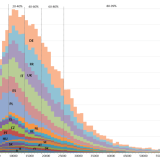Income inequality
Since the onset of the crisis, income inequality in the EU has increased because the process of income convergence between countries has stalled and income inequalities within countries have expanded. Pay and income inequality remains a concern and the working poor are still a substantial group among workers in the EU. Eurofound has carried out a range of research on these issues highlighting impacts on employment, living conditions and quality of life, and working conditions.
Eurofound has examined recent developments in the distribution of wages in the EU, focusing both on the EU dimension but also offering country comparisons in terms of income and wage inequality. Research has also explored the role that occupations play in structuring wage inequality in the EU.
A study on income inequalities and employment patterns before and after the Great Recession showed that the recession pushed inequalities upwards both for the EU as a whole and across most Member States. It demonstrates that unemployment and its associated decline in income is the main reason for inequality surges in recent years.
Recent research has also explored the case of in-work poverty and the ‘working poor’. Alongside direct measures by governments to prevent or alleviate inequalities and increase incomes, such as the minimum and living wage, progressive taxation, in-work benefits and social assistance, more policy attention is needed regarding indirect measures that improve living standards of the working poor households, such as more flexible working arrangements, housing benefits, upgrading of skills and childcare.
A policy brief on social cohesion and well-being in the EU considers how income inequalities undermine social cohesion and the well-being of European citizens.
Social inequality
Eurofound’s European Quality of Life Surveys (EQLS) explore inequalities across various indicators of quality of life. EQLS 2016 shows that despite improvements on some indicators, there are persistent inequalities on others. It underlines the dilemma that the rising tide of the post-crisis recovery has not lifted all citizens equally; quality of life for people in the lowest income quartile improved less between 2011 and 2016 than for others. The new topic in the 2016 survey has looked at ‘economising’ in savings on food, and delaying visits to doctor or dentist as ways to cope with deprivation.
The EQLS 2016 highlights that inequalities in access to and quality of care are significant factors in limiting access to employment and participation in society, as well as reducing quality of life. Large differences between Member States and between socioeconomic groups in ratings of quality of services emphasise the continuing importance of measures to address inequalities.
Differences or inequalities in health are receiving increased policy focus. EQLS data shed light on changes across the EU population as a whole and in relation to specific groups. The most pressing inequalities are related to income and are underlined, for example, in the experience of greater problems in accessing primary healthcare for people in the lowest income quartile, as well as lower ratings of satisfaction with the quality of GP and hospital services.
Women in the lower income quartiles are particularly at higher risk of mental health problems. Some groups, particularly the (long-term) unemployed, are much more likely to experience feelings of social exclusion. People with lower secondary education or less report higher social exclusion and, unlike others, there was no improvement on this between 2011 and 2016.
Eurofound has carried out a range of studies on the challenges facing older people and young people, both on entering the labour market and related to their social situation.
Social mobility
Across the EU, citizens and governments are becoming more concerned that – for the first time in decades – younger generations will have fewer opportunities for upward social mobility than their parents’ generation. This concern is shared by those on low incomes and the middle classes.
A Eurofound study sheds new light on the debate on social mobility in the EU and provides new evidence on patterns of intergenerational social mobility. It identifies key barriers to social mobility and reviews policies aimed at facilitating upward social mobility and equal opportunities specifically in the areas of childcare, early education, schooling and the labour market.
Gender inequality
A range of research on the topic of gender equality has looked in particular into inequalities in the working conditions of men and women, as part of Eurofound’s European Working Conditions Survey (EWCS). Other research has been conducted on topics such as the gender employment gap, the gender pay gap, pay transparency, work–life balance and flexible working arrangements, and more recently on discrimination against men at work. The European Quality of Life Survey underlines the message that women continue to carry out most of the unpaid household and care work.
Inequalities in working conditions
Besides gender inequalities in working conditions, research has also explored various forms of fraudulent work and of self-employment in the EU, issues facing posted workers, as well as the implications for working conditions and for social protection.































